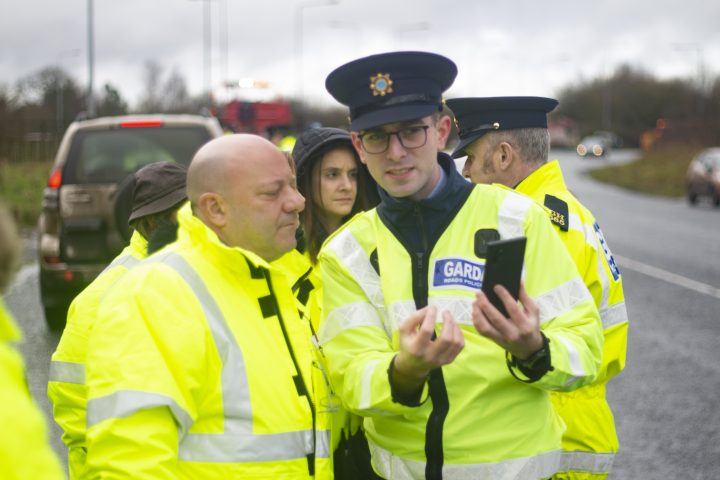Ireland study visit 2020

A Portuguese delegation from the National Road Safety Authority (ANSR), accompanied by the European Commission, participated on 27-28 February 2020 in a study visit on the topic of drink and drug driving prevention in Ireland.
The visit was hosted by the Irish Road Safety Authority (RSA), partners in the EU Road Safety Exchange project and included discussions with the main stakeholders in the fight against intoxicated driving and on-the-ground demonstrations.
RSA welcomes Portuguese delegation to share best practice in road safety https://t.co/rXiclt65ag #RoadSafetyExchange pic.twitter.com/fMqw6rIWeL
RSA Ireland (@RSAIreland) February 28, 2020
During the visit, the Portuguese delegation led by the President of the ANSR, met and discussed with experts and researchers at the RSA, the Department of Transport, Tourism and Sport, the Medical Bureau of Road Safety, An Garda Síochána (the Irish police), and the Public Prosecutor’s Office.
Participants heard about Ireland’s strategic approach to road safety, including intelligence-led enforcement, evidence-based policies, the contribution of forensic medicine and toxicology and the importance of prosecution of offenders.
Today we’ve been in Dublin with the fantastic @GardaTraffic, the inspiring @RSAIreland and the dedicated scientists of the Medical Bureau of Road Safety seeing how 🇮🇪 is tackling drug driving. Great knowledge sharing with 🇵🇹 as part of the EU #RoadSafetyExchange project. pic.twitter.com/EOESwMLZb9
European Transport Safety Council (@ETSC_EU) February 28, 2020
The Portuguese delegation shared the current situation of intoxicated driving in the country and engaged in discussions with their counterparts on further measures to tackle this problem.
A ANSR está a participar no Road Safety Exchange, um projeto de troca de ideias e experiências sobre segurança rodoviária a nível europeu.#ansr #segurancarodoviaria #RoadSafetyExchange pic.twitter.com/eSZcBhxwHK
ANSR (@ansegrodoviaria) February 28, 2020
On the second day of the study visit, participants had the chance to visit the headquarters of the Medical Bureau of Road Safety at University College Dublin and to meet with the scientists working there and see the equipment and technologies used for the analysis of samples.
In the afternoon the delegation joined a multi-agency checkpoint in County Kildare, observing how technology is used to aid police in their enforcement activities.
We were joined at a checkpoint on the R148 (Kilcock) today by colleagues in Road Safety visiting from Portugal. #RSMA #RSA #RoadSafetyExchange #ETSC pic.twitter.com/nk9KHocGTN
An Garda Síochána (@GardaTraffic) February 28, 2020
The Portuguese delegation and the Irish hosts were keen to continue the sharing of good practice in improving road safety and appreciated the role of the exchange project in pushing forward progress in reducing the number of road deaths and injuries.
Main takeaways
- A strategic approach to road safety is crucial in reducing deaths and serious injuries.
- Ireland has an Action Plan of 144 actions focusing on shared responsibility, accountability and deadlines for completion.
- There are set targets for fatalities, serious injuries, seatbelt wearing rates and compliance with posted speed limits. Tackling killer behaviours, including intoxicated driving, is a top priority.
- Road policing is increasingly being modernised and based on analytical data, allowing for intelligence led and targeted enforcement. A revolutionary “Mobility App” allows the Gardaí to access driver and vehicle histories instantly at the roadside, and giving them the possibility to process fixed charge notices, cutting down on back office paperwork.
- Ireland’s road safety advertising has been based upon the Education/ Enforcement Model in which the advertising is designed to win the moral argument, shape the climate of public opinion and build community support for increased enforcement.
- Driving under the influence of alcohol has not been solved in Ireland, leading to recent legislative changes (automatic disqualification at 51-80 mg), targeted strategic enforcement and targeted campaigns and interventions.
- Research is crucial to the formulation of road safety policy and the RSA research unit collects and analyses collision data, produces statistical reports and proposes and evaluates ways to prevent collisions.
- The Medical Bureau for Road Safety is the national independent statutory forensic body in Ireland responsible for the chemical testing of intoxicants in drivers. Responsibilities include approval, supply and testing of equipment, forensic laboratory based chemical testing and road traffic medicine research.
- The Road Traffic Act 2016 introduced preliminary drug testing (oral fluid) including Mandatory Intoxicant Testing checkpoints and per se drug levels. Since 2017, these checkpoints allow Gardai to test a driver’s saliva for cannabis, cocaine, opiates (e.g. heroin, morphine) and benzodiazepines (e.g. Valium).
- Prosecution of intoxicated driving cases in Ireland is often complicated by appeal on the bases of technicalities and procedural errors. However, a recent ruling from the higher courts showed that stated technical or procedural shortcomings that had not undermined an accused’s rights should not lead to the collapse of a prosecution.